Orchidea de Santis is a Actor Italienne born on 20 december 1948 at Bari (Italie)

Orchidea De Santis (born 20 December 1948, Bari) is an Italian television and film actress.
Her theater work includes comedies such as Morto un Papa se ne fa un Altro, Strega Roma and Chicchignola written by Ettore Petrolini, all of which were directed by Ghigo De Chiara and Fiorenzo Fiorentini.
De Santis appeared in Sottoveste by Castellacci e Ventimiglia and Love and Life by Mike Immordino. She wrote and acted in La Bambola Orchidea featuring the music of maestro Aldo Saitto, as well as Chicchignola with Mario Scaccia, and La cicogna si diverte by Carlo Alighero.
For the RAI radio, De Santis appeared in many roles, mainly in the serials Barocco a Roma and Racconto Italiano which were broadcast in the late 1970s. In the 1989 she began working in the international broadcasting department where she produced Notturno Italiano, AZ per gli Italiani all'Estero, Italia Canta, Itinerari Italiani, Facile Ascolto.
She was producer of the radio show L'Arca di Noè, and 13 episodes of Ciak si esegue. She also developed and produced a program about animals called L'Anello di Re Salomone. She is currently the director of, Due di Notte.
Her television work includes Roosvelt (Rai Tre 1986), Maga Circe and Lucrezia Borgia (Rai Uno 1987) and Il caso Redoli, a TV series: The Great Trials (Rai Uno 1996).
Outside of cinema and theater, she worked with the city government of Rome, organizing a review of 1970s Italian cinema called Italia (de)Genere.
Source : Wikidata
Orchidea de Santis

- Infos
- Photos
- Best films
- Family
- Characters
- Awards
Orchidea De Santis (born 20 December 1948, Bari) is an Italian television and film actress.
Biography
Orchidea De Santis is an Italian actress in cinema, theatre and television. Her films include Il Vizio di Famiglia directed by Mariano Laurenti, Per Amare Ofelia by Flavio Mogherini, Concerto per Pistola Solista by Michele Lupo, Colpo di Stato by Luciano Salce (1969) and Paolo il caldo by Marco Vicario (1973). She appeared briefly in Il Nero by Giovanni Vento (1965) and Una Macchia Rosa by Enzo Muzii (1970). Since the mid-1980s, her film work has declined in favor of other activities.Her theater work includes comedies such as Morto un Papa se ne fa un Altro, Strega Roma and Chicchignola written by Ettore Petrolini, all of which were directed by Ghigo De Chiara and Fiorenzo Fiorentini.
De Santis appeared in Sottoveste by Castellacci e Ventimiglia and Love and Life by Mike Immordino. She wrote and acted in La Bambola Orchidea featuring the music of maestro Aldo Saitto, as well as Chicchignola with Mario Scaccia, and La cicogna si diverte by Carlo Alighero.
For the RAI radio, De Santis appeared in many roles, mainly in the serials Barocco a Roma and Racconto Italiano which were broadcast in the late 1970s. In the 1989 she began working in the international broadcasting department where she produced Notturno Italiano, AZ per gli Italiani all'Estero, Italia Canta, Itinerari Italiani, Facile Ascolto.
She was producer of the radio show L'Arca di Noè, and 13 episodes of Ciak si esegue. She also developed and produced a program about animals called L'Anello di Re Salomone. She is currently the director of, Due di Notte.
Her television work includes Roosvelt (Rai Tre 1986), Maga Circe and Lucrezia Borgia (Rai Uno 1987) and Il caso Redoli, a TV series: The Great Trials (Rai Uno 1996).
Outside of cinema and theater, she worked with the city government of Rome, organizing a review of 1970s Italian cinema called Italia (de)Genere.
Usually with
Filmography of Orchidea de Santis (25 films)
Actress
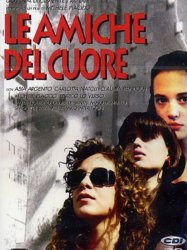
Close Friends (1992)
, 1h49Directed by Michele Placido
Origin Italie
Genres Drama, Romance
Actors Asia Argento, Claudia Pandolfi, Carlotta Natoli, Michele Placido, Enrico Lo Verso, Laura Trotter
Roles Elena
Rating63%






Rene the Cane (1977)
Directed by Francis Girod, Denys Granier-Deferre
Origin France
Genres Drama, Comedy, Crime
Actors Gérard Depardieu, Sylvia Kristel, Michel Piccoli, Stefano Patrizi, Riccardo Garrone, Jacques Jouanneau
Roles Kim
Rating48%





René la Canne est incarcéré pour attaque a main armée. Il arrive à se faire admettre en psychiatrie, en vue d'une prochaine évasion, et y rencontre Marchand, inspecteur de police refugié dans l'hôpital après avoir ridiculisé les autorités allemandes...
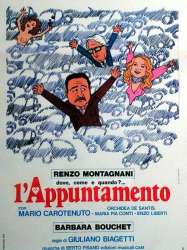
L'appuntamento (1977)
, 1h31Genres Comedy
Actors Renzo Montagnani, Barbara Bouchet, Mario Carotenuto, Orchidea de Santis, Antonino Faà di Bruno, Nerina Montagnani
Roles moglie del collega
Rating52%





Adelmo Bartelesi a une charmante collègue de travail, Adelaide Picchioni, qui est désirée par tous. Adelmo, persévérant, réussit à obtenir un rendez-vous avec elle, mais le trajet pour arriver à la maison d'Adélaïde présente quelques difficultés...

Under the Sheets (1976)
, 1h27Genres Comedy
Themes Films about sexuality, Erotic films
Actors Karin Schubert, Alvaro Vitali, Orchidea de Santis, Gigi Ballista, Ely Galleani, Enzo Andronico
Roles Nurse Italia
Rating50%





Three friends, students at the Pisa medical school are after their love adventures. Benito (Angelo Pellegrini) is trying to win the favours of Nurse Italia (Orchidea De Santis) but she seems to prefer the company of Prof. Ciotti (Gigi Ballista). Naïve Alvaro (Alvaro Vitali) is desperate to lose his virginity with his girlfriend Lella (Ely Galleani) without knowing that she lives a double life as a prostitute. Finally, Sandro (Eligio Zamara) is in love with the film's namesake Dr. Laura Bonetti (Karin Schubert), the fiancée of Prof. Paolo Cicchirini (Gastone Pescucci) who happens to be the butt of jokes at the medical school, and pretends to be sick to see her.
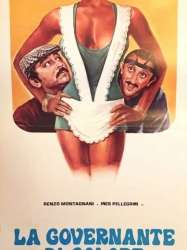
Genres Comedy
Themes Films about sexuality, Erotic films
Actors Renzo Montagnani, Ines Pellegrini, Orchidea de Santis, Carlo Delle Piane, Marisa Merlini, Gianfranco D'Angelo
Roles Santina
Rating49%





Nicola Salluzzi (Montagnani) is the owner of an insecticide company and his teenage son Simone (Jean-Claude Verné) has the habit of sleeping with his female employees. After Simone has impregnated successive housemaids and put the family name in jeopardy, Nicola and his wife Aspasia (Marisa Merlini) decide to hire a black housemaid, presuming that she will be just too ugly. However, the new housemaid Myriam (Pellegrini) soon attracts Simone with her exotic beauty. On the other hand, Nicola is also troubled in his relationship with his mistress Dr. Santina (Orchidea De Santis).
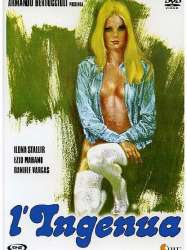
L'ingenua (1975)
Directed by Gianfranco Baldanello
Genres Comedy
Themes Films about sexuality, Transport films, Erotic films, Road movies
Actors La Cicciolina, George Ardisson, Orchidea de Santis
Roles Susy
Rating52%





Piero Spazin (George Ardisson) is a con artist who meets his friend Luigi Beton (Daniele Vargas), a fraudster, and the two get engaged in a new fraud scheme, also attempting to trick each other at the same time. Angela (Staller), a supposedly naïve employee of Piero's fiancée Augusta (Anna Maria Pescatori) becomes accidentally involved in their plan and agrees to accompany them on their journey. However, joining of Susy (Orchidea De Santis), another con artist to the group after meeting Luigi's son Rodolfo (Graziano Chiaro) makes things even more complicated.
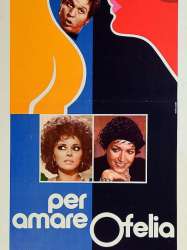
To Love Ophelia (1974)
Directed by Flavio Mogherini
Origin Italie
Genres Comedy
Themes Films about sexuality, Films about prostitution, Films about virginity
Actors Giovanna Ralli, Renato Pozzetto, Françoise Fabian, Maurizio Arena, Didi Perego, Orchidea de Santis
Roles Trieste - blonde prostitute
Rating64%





 , 1h45
, 1h45Genres Comedy
Actors Paolo Villaggio, Lila Kedrova, Eleonora Giorgi, Antonino Faà di Bruno, Orchidea de Santis, Renato Chiantoni
Roles Jolanda, la Sposa
Rating61%





The young noble Didino is a big baby and an introvert man who has trouble to socializing because of the possessive mother. He is still treated in thirty years as a kid and does not know what to do to overcome his shyness, because no one of his family listens to him, and his uncle, worsening the situation, believes that he is mentally ill and also homosexual. By mistake the old servant of the family dies in an accident at home, so the mother of Didino calls a new scullery maid: a beautiful girl who falls in love with Didino. He too feels love for her, but does not know how to react because he is afraid that the mother can punish severely him. Initially Didino manages to overcome the fears and also design the flight home with the maid. The mother agrees and one evening in tears, begging her son to grant to him the last bath. This is a pretext of the mother to drown her son, so she can stay with him forever, even after death. While Didino dies drowned the servant under the house waits in tears for his arrival .

La nipote (1974)
Genres Comedy
Themes Films about sexuality, Erotic films
Actors George Ardisson, Orchidea de Santis
Roles Doris - The Maid
Rating48%





Veneto in the year 1958. Wealthy engineer Luigi Favaretto (Vargas) arrives at his summer retreat to spend a quiet holiday with his dimwitted son Antonio (Roberto Proietti), second wife Zoraide (Annie Carol Edel) who is a former stripper, their voluptuous housemaid Doris (Orchidea De Santis), and Piero (George Ardisson), his friend but also Zoraide's secret lover. However, everything changes when Adele (Muzio), Zoraide's niece comes to stay with them following her mother's demise.
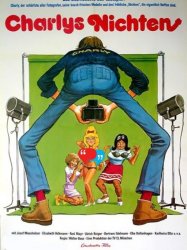
Charley's Nieces (1974)
, 1h15Genres Comedy
Themes Films about sexuality, Erotic films
Actors Josef Moosholzer, Orchidea de Santis, Edgar Wenzel, Ursula Reit
Roles Dominique
Rating41%





 , 1h10
, 1h10Directed by Rino Di Silvestro
Origin Italie
Genres Drama, Thriller, Pornographic
Themes Films about sexuality, Erotic films, Films about prostitution, Serial killer films, Erotic thriller films
Actors Maria Fiore, Elio Zamuto, Orchidea de Santis, Magda Konopka, Liana Trouche, Cristina Gaioni
Roles Benedetta
Rating49%





Le corps de Gisèle, 20 ans, est découvert caché dans un buisson. Tout porte à croire qu'elle a été assassinée. Issue d'un milieu bourgeois aisée, elle se livrait secrètement à la prostitution. Vice ou nécessité ? Chargé de résoudre l'affaire, le lieutenant Varale enquête avec son plus proche collaborateur sur le réseau de prostitution dans lequel la victime travaillait. Les collègues de Gisèle sont interrogées, tout comme le maquereau de la jeune femme qui, devant les enquêteurs, se fait passer pour le fiancé.
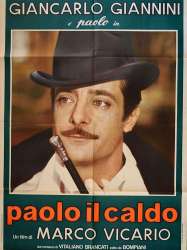
The Sensuous Sicilian (1973)
Directed by Marco Vicario
Genres Drama, Comedy
Themes Seafaring films, Transport films
Actors Giancarlo Giannini, Lionel Stander, Rossana Podestà, Ornella Muti, Riccardo Cucciolla, Gastone Moschin
Roles una prostituta
Rating59%





A Sicilian baron, Paolo Castorini has spent his life (beginning before puberty) dealing with girls, and later, women, usually in matters of the flesh. But later in life he begins to search for a deeper meaning to life. When his father is brought to his deathbed, Paolo (after making a pass at the dying man's nurse) is surprised to learn that the apparently staid, upright father had been unfaithful as a young man, as also Paolo's grandfather, and that such unfaithfulness had brought consequences both moral and medical.

Devil in the Brain (1972)
, 1h46Directed by Sergio Sollima
Origin Italie
Genres Thriller
Themes Serial killer films
Actors Stefania Sandrelli, Keir Dullea, Micheline Presle, Maurice Ronet, Tino Buazzelli, Orchidea de Santis
Roles Caterina
Rating64%





A child suspected of having killed his father, is imprisoned in a mental hospital. A doctor, finding him mentally healthy, began to suspect another truth.

Love, Passion and Pleasure (1972)
Directed by Giuseppe Vari
Genres Comedy
Themes Films about sexuality, Erotic films
Actors Malisa Longo, Giacomo Rizzo, Orchidea de Santis
Roles Dinda
Rating45%





Cecco, c'est le diable en personne. Mère Lucrèce, la belle religieuse, se laissera-t-elle séduire par le jeune et viril saltimbanque qui n'a pas hésité à s'introduire dans l'austère couvent déguisé en abbesse ? Ce qui est sûr, c'est que le jeune loup, lâché dans la bergerie, a de quoi se faire les dents sur ces magnifiques brebis sevrées d'amour.
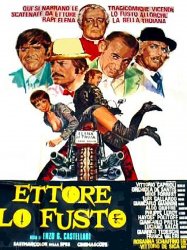
Hector the Mighty (1972)
Directed by Enzo G. Castellari
Genres Comedy
Actors Rosanna Schiaffino, Giancarlo Giannini, Philippe Leroy, Vittorio De Sica, Vittorio Caprioli, Aldo Giuffrè
Roles Briseide
Rating54%





 Connection
Connection



